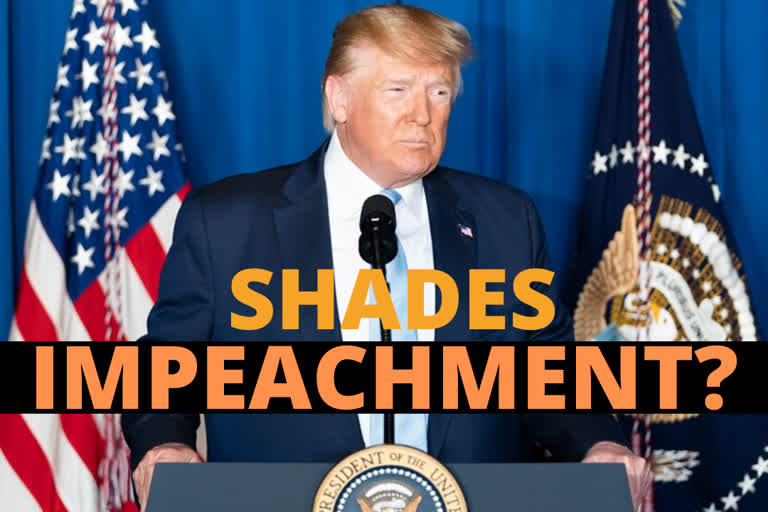Los Angeles: When US President Donald Trump ordered the killing of Iranian Major General Qassim Soleimani, he took a risk he had avoided earlier that has put the world on edge and overshadows his impeachment trial.
He is also changing the concept of asymmetric warfare on its head adopting a high-tech version of it that frees the superpower from committing conventional troops and hardware on the ground and instead relying on elements of surprise, superior intelligence and pointed strikes which were the strategy that weaker nations and groups have used but using people and conventional weapons.
If the confrontation with Iran escalates, the type asymmetric battles that the US has been waging in concept with missiles, drones and electronic and other surveillance would become the strategy of war that Trump will follow enabling him to keep his promise -- in word, if not in spirit -- of not waging wars abroad.
Read Also: With hours' notice, US fast-response force flies to Mideast
But Iran has been the master of this strategy and has a network of allies in the Middle East who can carry it on even if Trump carried out the threat he made to Iran in June of obliteration like you have never seen before.
If this type of asymmetric war breaks out in full force between the US and Iran, the casualties would be others - as has been shown by the recent attacks on ships in the Gulf and on Saudi oil installations by Tehran or its allies, and the US or Israeli actions in Syria, Iraq, and Lebanon.
Trump said on Friday that he ordered the elimination of Soleimani to make Europe and the rest of the world safer. The opposite may, in fact, be happening.
With that scenario of war in mind, France's deputy foreign minister Amelie de Montchalin said after the killing of Solaimani, "we have woken up to a more dangerous world."
Iran and its people are inured to wars and economic sanctions as seen by the Iran-Iraq War of the 1980s and various economic sanctions that could not shake their resolve.
An obliteration would only extend the chaos stemming from the decapitation of the leadership of Libya, Syria, and Iraq to Iran.
In an attempt to appeal to India, Trump said that Soleimani was behind terrorist attacks in New Delhi - perhaps thinking of 2012 injuring of an Israeli embassy official's wife and others which has been attributed to Iran, though the case has not been conclusively solved by the Delhi Police.
Iraq and Saudi Arabia are India's top oil suppliers and about 60 percent of petroleum and gas supplies come through the Gulf. Combine the risk that poses with the specter of energy price hikes and India's economic reboot from slowing growth could be in jeopardy.
The same geopolitical factors would also impact the world economy beyond the energy sector.
The killing of Soleimani is different from that of Al Qaeda boss Osama bin Laden or Islamic State (IS) chief Abu Bakr al-Baghdadi. They were spent forces and were non-state actors, just terrorists.
But Soleimani was the official of a government and was at the apex of his power controlling or influencing a vast network of militias and operatives across the middle east.
The Iranian Quds Force that he commanded and the affiliated militias were an indirect ally of the US in the war on the Islamic State in Iraq and Syria.
An escalation of the Iran-US confrontation could undo some of the gains against the IS.
Iran wields considerable influence over Iraq - an unintended consequence of George W. Bush's foolish foray into Iraq. Just when protests were growing against the Baghdad government and Iran's influence over it, Soleimani's killing has put a damper on it, running counter to US interests.
Read Also: Trump warns of targeting 52 Iranian sites if tensions escalate
It would be a plus for Teheran if the US is made to withdraw its troops from Iraq or scale down their presence because of the threats from Iran and its allies or because of pressure from the Iraqi government peeved that the US operation was carried out on its soil.
In US domestic politics, there is a precedent for the mid-impeachment foreign attack. Bill Clinton ordered four days of bombing of Iraq in 1998 while he was being impeached causing a distraction just like Trump has now.
The leaders of the Republicans in the Senate and the Democrats in the House of Representatives haven't agreed on the impeachment trial that must take place in the Republican-controlled Senate and the Soleimani killing has added a note of cynicism and uncertainty.
The Democrats are in a bind over the Trump orders to kill Soleimani who they admit was an evil, anti-American mastermind responsible for the killing of American troops and civilians and are not sorry to see him dead and perhaps even relieved that he is.
So they cannot criticize Trump for doing it, but have, therefore, focused their attacks on how he did it. Former vice president Joe Biden said that it was like throwing a stick of dynamite into a tinderbox.
How it would play out in the elections is a different matter. Former President George W. Bush was able to ride to re-election in 2004 because the Afghan war linked to 9/11 a direct attack on US soil and the Iraq war was somehow swept into it.
But his father couldn't cash in on the Kuwait War and lost to Bill Clinton in 1992 because the Iraq invasion of Kuwait was not a direct attack on the US.
That is the case with the Soleimani attacks and unless Iranians mount an attack in US soil the polarised nation will not unite behind Trump.
Read Also: Trump warns to hit Iran harder than ever before if US attacked



